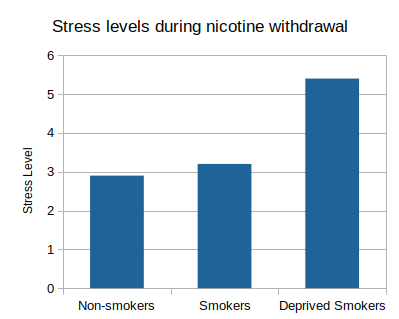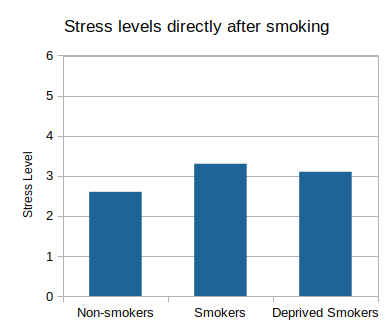Contrary to popular opinion, smoking isn’t relaxing. The evidence shows smoking actually causes stress, rather than reduce it. That “aahhhhh” feeling when you light up, is an illusion. If you’re a smoker reading this, it’s hard to prove this to you, because from your point of view, you have a certain level of stress, then you light up a cigarette, and that certain amount of stress reduces. Based on your first hand experience, cigarettes are relaxing, and what more evidence could you possibly need than your own first hand experience?
The theory behind this is called the ‘Deprivation Reversal Model’. Smoking creates stress between cigarettes, and removes it during and immediately after smoking. There’s a little experiment that you can do that will make the idea behind this model more clear. First, find a wall. Any good, solid wall will do. Next, walk right up to it, so you’re toes are touching it. Then, repeatedly bash your head into the wall. Go ahead! Keep doing it for about a minute, taking note of how you feel. Then stop, and again take note of how you feel.
Now I’ve never actually tried this myself, but I’m told that after you stop, you feel relief, the pain is reduced and you just generally feel better than you did when you were banging your forehead against solid concrete.
This the analogy for smoking. Banging your head represents the time between cigarettes (withdrawal), and stress gradually increases during this time. Stopping banging your head represents having a cigarette, after which, some of that stress is removed. The low-stress period lasts about an hour, then you re-enter withdrawal, and you’re back up against the wall.
How do you know?
First you might ask yourself, if cigarettes relax you, why are they more pleasurable when there has been a long time since the last one? Surely the opposite would be true; if you had eight cigarettes in a row, you should get more and more relaxed, and perhaps eventually fall asleep. But you don’t.
Second, when the mental health of a large group of people was tracked over a long period of time, researchers found that taking up smoking in the teens leads to various psychological problems further down the line; and these problems weren’t as prevalent in people that didn’t start smoking. (1)
Third, there have been some experiments testing the link between smoking and stress. Here’s one example; mood questionnaires were used to compare smokers’ stress levels with non-smokers and deprived smokers (smokers who had not smoked for about 12 hours). Here are the results:

As you can see, non-smokers had the lowest stress levels overall, but only marginally – smokers who had smoked earlier that day had roughly the same stress level as non-smokers, but smokers who had been deprived of cigarettes for 12 hours or more, had become pretty stressed out!
Then look what happens if you let the smokers smoke, let the non-smokers sit and rest for five minutes or so, and give the test again:

Deprived smokers are no longer deprived, so now their stress level is roughly the same as everyone else’s. It seems stress isn’t causing people to smoke, at least not primarily, but rather smoking is causing stress. (2)
Because of this, smokers’ moods fluctuate through the day, with periods of increased stress between cigarettes and periods of normality just after smoking. It’s a roller-coaster, not a particularly enjoyable one, and the heavier smoker you are, the heavier the ups and downs.
This is one difference between cigarettes and other forms of addictive drugs; rather than being in a normal state and then getting ‘high’, you are in a stressed state and then get ‘normal’. Let’s get normal! But from a smoker’s perspective, it’s the same experience. It’s just like your subjective experience of stopping banging your head against a wall – it removes pain, but only the pain it caused to start with.
Double Whammy
Where smoking differs from our earlier head-banging experiment – and by the way, if you actually tried that, you have bigger problems than smoking – is that smoking is a behaviour that reinforces itself. You get chemically rewarded when you smoke, and chemically punished when you don’t smoke.
I actually learned all this the day after I quit; by pure, ridiculous chance. I had a lecture on nicotine. I sat through 3 hours of talking about smoking and cigarettes, which wasn’t particularly what I wanted to hear. But it did seem to work, because once I understood how nicotine worked, and the physical and mental effects smoking has on people, I didn’t smoke again. Well that’s not true, I actually switched to cigars for a while (and eventually stopped that too – ten a day was getting too much), but I definitely haven’t smoked a cigarette since then.
Quit Cold Turkey or Cut Down Slowly?
Stress, along with the other withdrawal symptoms (irritability, anxiety, anger, poor concentration, strong cravings for cigarettes, restlessness, insomnia, increased appetite, weight gain, impatience, etc.) start about an hour after the last fix. They then increase in intensity, and peak sometime within the next three days or so (The Three Days of Hell, as they are sometimes known).
Studies tracking peoples’ moods over time find that the few weeks after quitting smoking invariably bring poor moods because of these withdrawal symptoms. After which, they improve over the longer term.
But, if you smoke during this period – even if you just have the odd cigarette – you’ll put yourself back into a state of withdrawal, and you’ll have to go through it all over again. You need to quit cold turkey. Although, note that very heavy smokers should cut down before quitting altogether – if you go from heavy smoking to nothing overnight, it can be a shock to the body as it’s gotten used to all the nicotine and other chemicals being there, and adapted around it. It’s a little bit like a tug-of-rope where one side suddenly lets go – the other side, still pulling, fall all over themselves.
Try to avoid passive smoking too. From the point of view of trying to quit, it’s not really the bad moods that are the problem, it’s the cravings. If you smoke after quitting, you’ll actually strengthen the cravings for more, not reduce them, which is what you’re hoping. Don’t worry if you do give in though; it may take a few attempts. Feel like making one today?
Recommended Reading:
References:
(1) McGhee, R., Williams, S., Poulton, R., & Moffitt, T. (2000). A longitudinal study of cannabis use and mental health from adolescence to early adulthood. Addiction, 95(4), 491-503.
(2) Parrott, A.C. & Garnham, N.J. (1998). Comparative Mood States and Cognitive Skills of Cigarette Smokers, Deprived Smokers and Nonsmokers. Human Psychopharmacology, 13, 367-376.
See also: Parrott, A.C. (2000). Does Cigarette Smoking Cause Stress? American Psychologist. 54(10), 817-820.
and: Parrott, A.C. (2000). Cigarette Smoking Does Cause Stress. American Psychologist. 1159-1160.
Comments
8 responses to “Smoking and Stress”
If ever there was any proof needed to demonstrate how irrational human beings are, its smoking!
But you bring up a very important point:Education.
If you really care about someone and wish the best for them by prefering they did not smoke, simply telling them smoking is bad for there health and general well being will more than likely make you sound like a pest!
But if you were able to provide them with cold hard facts about the damage smoking can do, in a way that they feel like they are actually informing themselves, they then realise the ‘error of there ways’ and really see how stupid smoking is.
My headmaster at school told us in assembly he gave up smoking immediately when he went to an exhibition that showed a smokers lung next to a non-smokers ‘healthy’ lung.
Exactly, it worked for me and your headmaster. Will it work for anyone else? I dunno, we’ll see I suppose. I’m writing another one which lists all the different health problems associated with smoking. Hoping to get a few pics in there too. It’s not really psychology-related though, so I may not post it here, but I’ll link to it, wherever it ends up.
As a smoker getting ready to embark on the stressful act of quitting smoking I agree with this post. It is hard to convince someone that that feeling of relief is relieving their stress.
What if the stress is induced from the feeling of wanting a cigarette in the first place? That is why the cigarette makes you feel like you have reduced some stress, you are the stress that wanting a cigarette breeds.
Also are you addicted to the act of smoking itself. Picking up your pack, tapping a cigarette out, lighting it, smoking it and stamping it out are all part of the addiction you are a victim of.
On my blog I have decided to start a program helping people with this problem. I too am going to participate in this and hope others do too because it will with no doubt save lives.
If you want to see what i am doing some check it out. All are welcome and encouraged to participate.
I think smoking can cause stress in the fact that it is highly addictive and the financial strains it can put on you – i spend over £200 a month, i also think on the flip side of the coin that if i was to suddenly quit that would be stressful yet again, i can’t win!
Wow now thats food for thought as a smoker myself, I also believed that having a smoke actually calmed me down, but it was just my own conscience stating so. I think I am going to have to really think about giving up this habit its just the thought of the cravings that have put me off for so long.
Awesome Elliot! Alan Carr’s book is pretty good for that. Best of luck and keep me updated on how you’re doing!
I honestly never thought about it that way. Would you suggest that alcoholism and other addictions or impulsive acts share similar traits?
Many people are afraid to stop smoking because they believe they will not be able to cope with the stress. It’s of course true that the first days of withdrawal are like hell, but it will get better over time until you reach your ‘normal’ stress level, just like before you started smoking. Find the power within yourself to get past this initial stressful period and you’ll be fine!